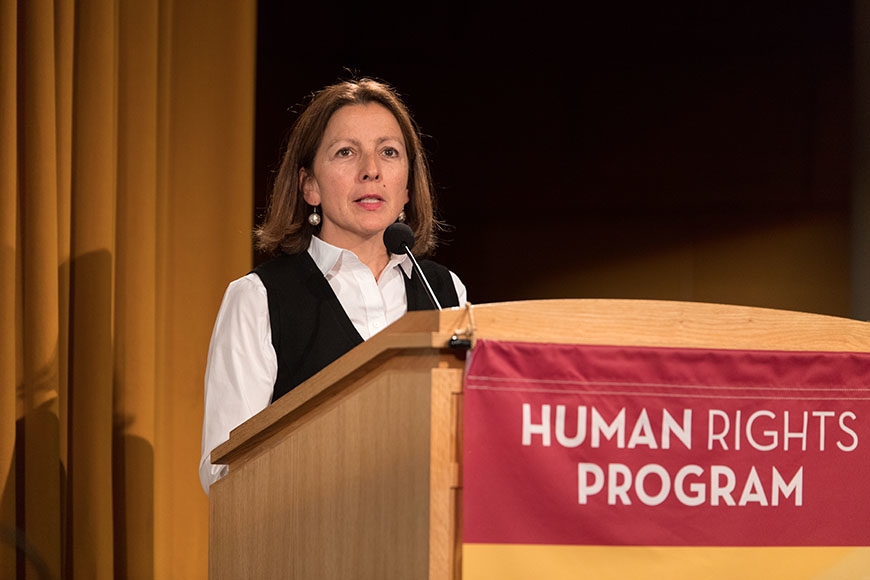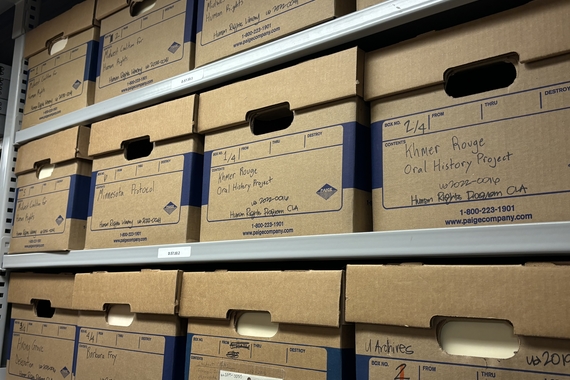Principled Voice on Indigenous Peoples and the Environment
Kathleen Padulo, Environment Director of the Chiefs of Ontario (COO) and member of the Oneida Nation of the Thames, was greeted by nearly 200 guests attending this year’s Scallen Lecture in Human Rights, “Principled Voices: Indigenous Peoples Need a Say on the Environment.” The “Principled Voices” series was established through a generous gift from Stephen and Chacke Scallen to explore the erasure of cultures and understand the role of corruption in human rights violations. The series provides an opportunity to highlight some of the most important leaders and thinkers on these issues.
Kathleen Padulo, our 3rd Scallen Lecturer, recently brought her message of the critical need for Indigenous Peoples having a say on environmental issues to the University and broader Twin Cities community. Padulo had a busy few days in the Twin Cities, spending time discussing her advocacy work with people beyond the University community, networking with Indigenous and environmental advocates, and meeting with UMN students, staff and faculty. She was also interviewed by Paul Huttner for MPR Climate Cast and Roy Taylor of KFAI’s Indigeneity Rising program. Padulo’s formal presentation for the Scallen Lecture on October 22, 2019 was engaging and informative, drawing the largest audience to date for the annual event.
Recognizing the University of Minnesota as situated on the traditional, ancestral, and contemporary lands of the Dakota Peoples, Padulo spoke about Indigenous Peoples’ intimate connection to land and water, viewing the health of the physical environment as synonymous to the health of their communities. Citing statistics related to access to safe drinking water in First Nations communities in Canada, Padulo noted multiple regulatory gaps and the lack of legal protections that exist on reserve lands, while also discussing the challenges she faces in advocating on behalf of the 133 First Nations of Ontario. People on reserve in 85 of Ontario’s First Nations communities face a water supply that is unsafe for drinking. Boil advisories have been the reality in some communities for more than 20 years. Lower-income or financially struggling families feel the water crisis intensely. The crisis additionally impacts the cultural rights of First Nations Peoples and their traditions as keepers and protectors of water.
Padulo is a tireless advocate whose efforts take her to the most remote areas of the province, staying in close communication with First Nations communities and leadership while simultaneously engaging at the highest levels of provincial and federal government. Her objectives are laser focused on keeping First Nations communities informed of Government’s environmental policies that would impact their treaty rights and identifying avenues for Indigenous peoples’ to engage meaningfully in policy making arenas.
In 2015, Human Rights Watch (HRW) took note of Padulo’s work, inviting her and the COO to work with them in investigating the water crisis facing First Nations communities in Canada. Recognizing that communities in Ontario faced some of the most dire situations, areas where generations have grown up without ever being able to drink tap water at home, researchers conducted extensive surveys which, in turn, informed an advocacy trip to the United Nations (UN) early the following year. In February 2016, nine First Nations women, including Padulo, made a trip to the UN Committee on Economic, Social and Cultural Rights (CESCR) in Geneva, Switzerland. The Committee's concluding observations included urging the government to live up to its commitment to ensure access to safe drinking water and to sanitation for the First Nations while ensuring their active participation in water planning and management. In doing so, the Committee noted that water is not only an economic right but has cultural significance to Indigenous Peoples -- the first time that this human rights treaty body asked a country to consider water as culturally significant. Details on the Geneva trip as well as findings from the HRW investigation can be found in, “Make it Safe: Canada’s Obligation to End the First Nations Water Crisis”, the concluding report released by HRW in June 2016.
With the release of “Make it Safe” and faced with the finding that they had violated a range of international human rights obligations by failing to provide a safe water supply to First Nations reserves, the Canadian Government took steps to increase transparency and to work more closely with impacted communities in remedying the situation. But, as Padulo shared, there is so much further to go to ensure all First Nations communities have access to clean, potable water.
COO continues to keep the pressure on, calling on First Nations communities to work on the front lines advocating for sustainable water systems under cooperative efforts with government based on truth and reconciliation and holding the government accountable to aboriginal and treaty rights. COO is working to implement a Water Declaration as the foundation for decision-making on issues related to water, focusing specifically on water quality and quantity, safe drinking water, traditional ecological knowledge and Great Lakes governance and restoration.
Additionally, COO’s advocacy work with HRW continues as evidenced by last week’s release of “The Human Right to Water: A Guide for First Nations Communities and Advocates ,” a guide to using the human rights framework as an additional tool in advocating for safe drinking water. While First Nations Peoples have aboriginal and treaty rights from which they can build their advocacy, the drinking water crisis on reserve is a space where human rights are also highly relevant. The guide provides an overview of the legal framework behind the human right to water and recommendations on how to work with government officials and others toward the realization of this right.
At the heart of Kathleen’s advocacy work with the Chiefs of Ontario is the absolute need for Indigenous Peoples and communities to have the rights, leadership, and decision-making power they should have around water, energy, environmental assessments, mining, and climate change, and to have their treaty, constitutional and human rights recognized and respected. We are grateful for Kathleen’s “principled voice” on these critical issues and were deeply honored to have her as our guest.



